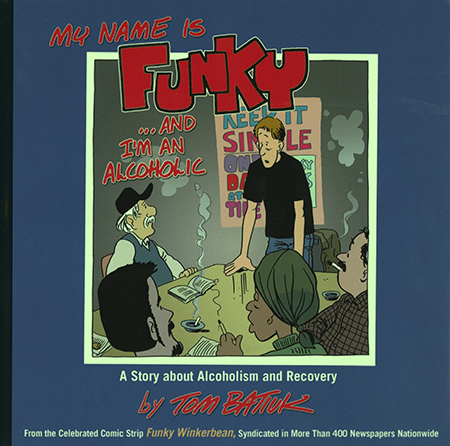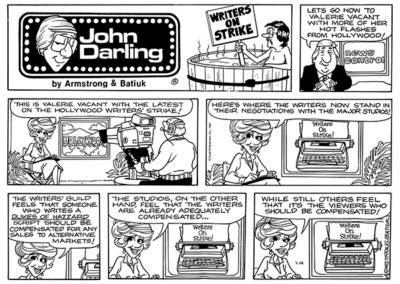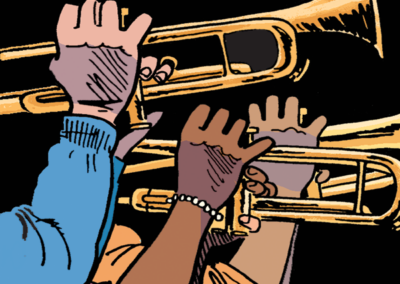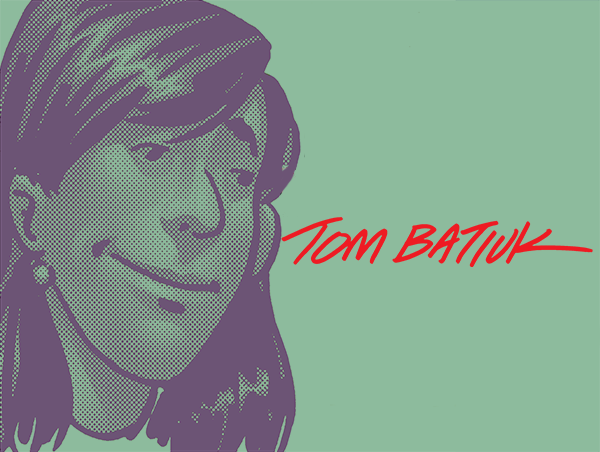My name is Funky is an accidental book. At least it wasn’t planned. After the story arc dealing with Funky’s addiction had run in the newspapers, I was contacted by a member of Alcoholics Anonymous who wanted to see if the Hazelden Foundation, a group that helps people escape the disease of addiction, would consider collecting the work in a book. I said that he could run it by them and then pretty much forgot about it. Some time passed and then one day I heard from Hazleden saying that they indeed would like to publish a book that would collect that body of work. The introduction to the book pretty much laid out the genesis of the story, so I’m presenting it here.
The story of Funky’s battle with alcohol was a long time in coming. Not only did my skills and abilities as an artist need to grow in order to properly tackle such a story arc, but it also had to await my own growth and maturity as well as the growth and maturity of my characters.
Even with those elements in place, the hard work of telling this story was only beginning. The idea of testing my eponymous lead character with something as potentially devastating as alcoholism was fairly daunting. Nothing like that had ever been done before in the comics. The approach to alcoholism in the comics has long mirrored societies misconceptions about the problem. Since the comic strip’s inception, the depiction of problem drinking has typically been old school, and traces its roots to prat falling drunks in vaudevillian sketches. Whether it’s a hard drinking army colonel, an unemployed- sponging- ne’r do well, or a besotted court jester, the alcoholics problems were always treated as the butt of the joke. Attention was never paid to the pain of the alcoholic and those around him or her.
It seemed to me that the comics were capable of more. As with all art, they can be a way to help order the world, to help the observer fill in the blanks for the insights or truth that may be missing. As an artist, I believe the you should challenge not only your own expectations, but those of the audience as well. I also believe that comics can and should be thought provoking rather than simply thoughtless. If I was going to tackle alcoholism, I wanted to cast aside the stereotypes and deal with the reality.
In order to do that, I needed to get the facts about the disease down as correctly as I could. My initial research started with a lot of reading, which of course led me to Alcoholics Anonymous. This was followed by a reading of The Twelve Steps and Twelve Traditions, a visit to an AA meeting. Eventually, I stood on the front lawn of the house in Akron, Ohio where AA founder Bill W. had lived. In fact, Bill W.’s house can be seen in the background as Funky and his sponsor, Wade, walk past it on a chilly winter’s evening.
While technical facts are important, it’s the human aspect that drives the story. I don’t feel that any human experience is really inaccessible if you’re willing to honestly make the effort to look inside for the for the emotions that drive us all. I tend to think of it as a compassionate artifice which allows an artist to identify and empathize and tap into the core elements that define us as human. We all carry within us the seeds for growth, as well as the seeds of our own destruction.
Every work speaks to some audience. Taking the thought one step further, good art makes people believe the artist… the best art makes them believe in themselves. My hope for this work is that it can be a beginning step in that latter direction.
By happenstance, My Name is Funky came out at the same time as Lisa’s Story The Other Shoe, and as a result was basically swept away by the tsunami that Lisa’s Story engendered. Which was too bad because it was a well presented collection and the story it told deserved a better fate.





